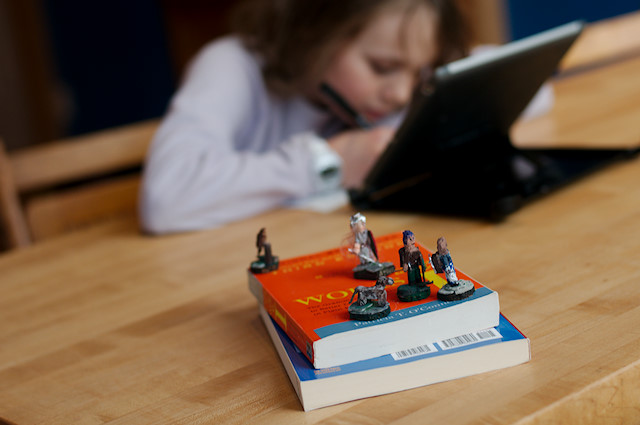Get posts by email
A definition of study
February 28, 2013
Post two of the The Adventure of Learning series.
The post I am attempting to write, what our children learn when we study, is turning into a manifesto of sorts. Or a monster.

Instead of making this really long and having the blog stay silent for a couple days while I write a minibook, I'm breaking it up, again. When I sat down to finish the thoughts on the post I published yesterday, Why can't learning look like this? I figured I should probably define study.
And that's where things got out of hand.

My thoughts on the subject are difficult to express in a single blog post. My childrens' study and my own study are my life right now. How do I express years of philosophy and practice in a simple blog post?
Here's my attempt.
A Definition of Study
Study is not just reading, writing papers, and taking exams. This very narrow definition of study limits our thinking. Narrow thinking will squeeze the joy out of your homeschool environment (and add unnecessary worry) as your tendency will be to assign greater value to certain "schoolish" activities over the less "schoolish" ones. When you do this you (knowingly or unknowingly) de-value all the many forms of study; and in doing so you limit the amazing options and freedom available to you in the homeschool environment. Don't do that.

Think about it, when a person goes to art school their study involves lots and lots of drawing. This is obvious. So why can't your child's study involve lots and lots of drawing? (If that's their thing.) When a dancer studies he dances. When a scientist studies she does field work. When a homemaker studies she experiments in the kitchen.
Those are just a few examples, but the everyday practice (and training) for any profession, calling, or vocation involves a myriad of methodologies. It is no different in our homeschool.

Céline is "playing with graphics" for hours a day right now; as part of her role playing game curriculum. Specifically, she is learning how to use image manipulation software. This is study.
We have to get over the definition of study as being "schoolish" activities - reading, writing, and exam taking. These logic intelligence, right brain dominant activities are grossly favored in traditional schooling. This is because these are easy methods for teaching and assessing a large group of students. (Who has time to interview 30 kids or 400 college students to test their knowledge of the subject?) Homeschooling your children is not a large group setting, why apply the same model?
These traditional and "schoolish" definitions of study are part of study, but they are not the sum total.

Study is engaging your head, heart, and/or hands (or body) to learn something.
One more thing - this hang-up about how we define study is one of the major stumbling blocks (there are a few) to people giving their children a freedom education, especially in the young adult years. When a child is given a love of learning elementary years education, as a young adult they will want to apply themselves to more serious study. This, by the way, is one of the major premises of the Leadership Education model.

The problem many parents have is that they don't recognize study when it's staring them right in the face. They're expecting a sudden interest in reading Homer, or something like that. The other problem, far worse I believe, is a heavy handed approach to the early years which squashes the self-motivation out of the child by the time they reach their young adult years.
I've asked the question Why Can't Learning Look Like This? and today I defined study. I think I'm finally ready to get to the point of this three (maybe four?) part series - what exactly do our children learn when we study.
Filed Under
Part of Series
Resource Library
-

Sarah on March 1, 2013, 12:38 a.m.
It made me smile that you used my school's modo in your post. "Educating the head, heart and hands." :) We have a tech-arts program and community service program that are central to the school, so that's the hands and heart parts, if you're wondering.
-

Kika on March 1, 2013, 1:21 a.m.
Yes. This makes sense. Sometimes kids DO all of a sudden have a great desire to learn about "Homer" (or WWII or Greek Mythology or horses or how to sew a quilt or play a piano piece way beyond current grade level or a country they dream about visiting...):)
Thanks for the discussion, Renee. I've been thinking about your other post all day. I really want to hear your thoughts. There are sooo many influences that all jumble up and form one's thoughts on education: cultural background, personal experience, current community/environment, etc. A couple examples, I've said this before but b/c of my husband's escape from poverty only due to his university education he has a bias in favor of higher education (although has really softened in his definition of education over the years of homeschooling our own children). Also, where I live many young people do not pursue further learning (in any form) b/c they can make big bucks in the oil/gas industry (I'd rather my child pursue further education than head in this direction).
I was also thinking about how my son plans to head to post-secondary to study animation. Another person could self-study and become successful without the certification he'll hopefully earn. However, he wants to attend school and learn from others, meet other like-minded people, etc. And he recognizes that he is not a self-starter/gets distracted very easily and so concentrates better in stricter environments. I'm glad he has a good understanding of himself.
Anyways, it seems you have the ability of inciting many of your readers to write novellas in response to your posts:)
-

renee on March 1, 2013, 7:35 p.m.
Kika, I have been thinking a lot about this discussion also. It has unleashed a torrent of words in me, that haven't yet been published. These words and thoughts have been simmering at the surface for so long and as long as a stay focused next week and don't get distracted by brighht shiny objects (different writing ideas), I may actually get them published. I think you are so correct about cultural and familial influences on how we view and define schooling, education, learning, etc. We are now entrepreneurs and making our way in the world with a largely autodidactic approach. Both of what Damien and I do right now to earn a living has been self taught. Damien is an amazing technologist and computer programmer - all self taught (this is the work he's done for almost his whole adult life). He studied civil engineering and from the year he graduated he pursued a self-education (under the tutulage of mentors) in computer programming. This seems to be how we are wired. But it is also a choice we have made - to take charge of our own future, our education and our children's education. Now Damien is studying other things which he hopes to do in the next stage of his adult life, as am I. So that's just one thought, I have many. My other thought, as related to your comment is this: seeking accredited scholarship is a very valid form of self-directed learning. The learner knows what they want and they seek the means to achieve that goal. And in many cases the means are a formal course of study. I can totally relate to your son. I am applying myself to a much smaller scale learning enterprise by taking french lessons vs. self-teaching at home. Yes, I could use at-home resources but I need the accountability. I want the direct teaching. I want the group learning environment. These are helping me reach my goal of learning french. And I'm willing to pay for it even. It's not about one kind of learning environment or learning path being better than the other, it's about "does this form of instruction, this method of teaching, this exercise, etc" meet the learner's needs and goals. (Not the goals we think the learner has, the goals they really have). If yes, that is self-directed learning regardless of where the learning happens. I think it's important to note the learner's needs and goals are very different throughout one's lifetime. The learning needs of six year old are very different from a sixteen year old. My big problem with most mandatory and institutional education is that it is not meeting the learner's self-directed needs, it's meeting the needs of administrators, bureaucrats, and societal engineers (and the needs of parents for inexpensive child care). Most modern education is about maintaining the status quo (don't question why you have to learn a, b, c, just do it because someone decided that already for you. Don't like it? Too bad. Here's a gold star for doing well at something you didn't care about in the first place.) Most grade school and high school instruction is not about how to unleash the full potential of the individual, preparing that person for a unique and Creator-imprinted mission. Most schooling is about conformity with a conveyor belt, factory mindset. I don't have a problem with post-secondary education, or other forms of formal learning. We need those institutions. (And we also need public school since most parents are not up to the task, financially or emotionally, of providing an education for their kids.) My concern is that these institutions mostly serve the needs of society-at-large (and if you don't agree with the values of society-at-large this is a major disconnect) not the learner, unless the learner knows how to work the system to their benefit, which is what a lot of self-motivated young adults and adult students do. They take the schooling they need to take to reach their goal. Which is what is sounds like your son is doing. But I must stop now. Because I just wrote a post-length comment.
-

Sarah on March 4, 2013, 4:28 a.m.
Renee, just curious... do you think that education (and children's schedules) should meet their needs in the moment (when they're 6, say) or their (possible) future needs? Do you think there is any disparity between the two? Should it be a "balance" (that how your home education seems to be set up to me...)?
"Most grade school and high school instruction is not about how to unleash the full potential of the individual, preparing that person for a unique...mission. Most schooling is about conformity with a conveyor belt, factory mindset."
I totally agree with that. The school system doesn't view us as individuals (and I cannot way that I have an easy answer as to how the government can "quality control" the education of millions of individuals--that may sound super conformist in the way of thinking about schools... but I do think that children should learn to do basic math and to read and write--on their own time and with lots of individual help, if needed--I don't completely believe in unschooling.)
And you're right--the school system is set up with a factor mindset... not just producing "products" but also producing products to go to a few set positions--NOT to be innovators (whatever form that may take), but to hold a set "roll"--and often that role was a factory job (especially if the person didn't get far in their schooling). Schools were set up for an industrial model... and our economy is a KNOWLEDGE AND INNOVATION BASED ECONOMY. Ahhh
-

renee on March 4, 2013, 11:55 a.m.
Both. And I do not think there is a disparity. The needs of a six year old do prepare them for their future. Sorry to be so brief, trust me, I have much more to say but I can't spend much more time on this right now.
-
-
-
-

Rachel Wolf on March 1, 2013, 2:33 a.m.
YES! I'm cheering in agreement over here, Renee. I think so often fear clouds our knowing of what is study and what is not. In truth, most everything my children (or I) engage in each day is study. It might not be tidy, but we are raising passionate life-long learners. Thank you for your wisdom.
-

Joan on March 1, 2013, 1:42 p.m.
Love it, a great inspiration as always!! Thanks
-

Deborah on March 2, 2013, 4:44 p.m.
I don't think I've ever commented, but I just happened to find a quote that goes along with your current thoughts. I've been reading about Maria Montessori (my own self-study), and she wrote, "To study is not to live, but to live is precisely what is most necessary in order to study."
-

renee on March 2, 2013, 4:50 p.m.
Thank you Deborah for commenting and thank you for sharing that quote.
-
-

Jamie {See Jamie blog} on March 9, 2013, 2:06 p.m.
Enjoying this little series greatly. :)
You can subscribe to comments on this article using this form.
If you have already commented on this article, you do not need to do this, as you were automatically subscribed.






Kim on March 1, 2013, 12:16 a.m.
Loving these posts...keep them coming :)